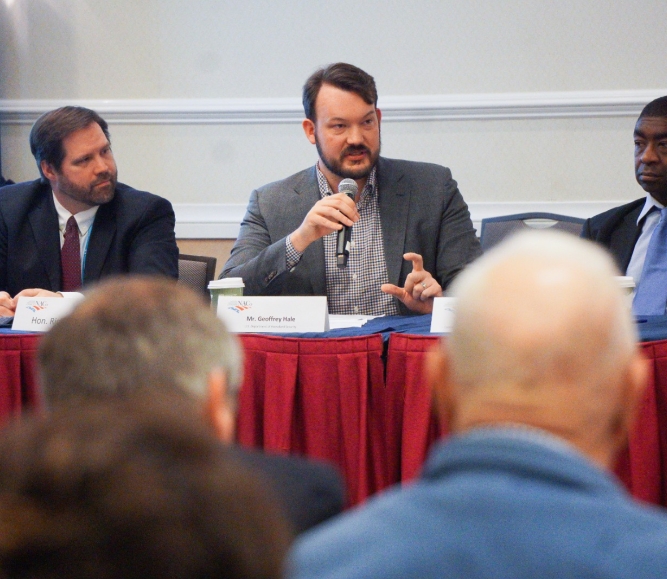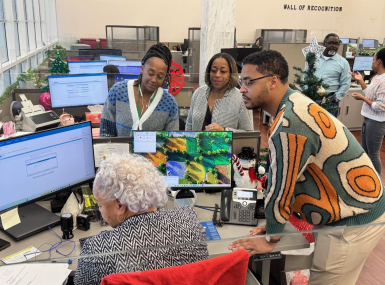County election officials voice support for voter roll organization
County election officials in nine states have lost access to a crucial service for checking the integrity of their voter registration lists, and more may follow. The nonprofit Electronic Registration Information Center — ERIC — joins 24 states and the District of Columbia in a data-sharing agreement that checks for voters registered in multiple states. It was founded in 2012 by a bipartisan group of seven secretaries of state.
Since 2022, Alabama, Virginia, Iowa, Texas, Missouri, Florida, West Virginia, Louisiana and Ohio have left the organization and Utah, a founding member, is considering doing the same. The Utah Association of Counties recently passed a resolution supporting the state’s continued membership.
“It is an incredible tool,” said Curtis Koch, president of the Utah association and Davis County’s auditor, who previously served as clerk/auditor and oversaw the county’s elections. “As a county that’s been involved in administering safe, secure and transparent elections by mail since 2014, ERIC is a key tool to doing that.”
Census data shows that among the states that left ERIC, Alabama, Florida, Virginia and West Virginia saw migration rates in 2022 that were higher than average, adding to the number of likely new registered voters that counties in those states would have to validate.
Through ERIC, every 60 days, member states submit their voter registration data and corroborating information from their departments of motor vehicles and ERIC staff generates four reports:
Voters who appear to have moved from one ERIC state to another
Voters who appear to have moved within the state
Voters with duplicate registrations in the same state
Voters who have died (using voter registration data and Social Security death data)
“The misconception I think a lot of folks have, is that it’s somehow touching our voter rolls,” Koch said. “It is not touching our voter rolls. States submit their information and ERIC says “There’s an anomaly here, go look at it, take care of yourself,” and it’s up to the clerk whether to act on the information.”
In ERIC’s first 10 years, it identified 12.5 million cross-state movers, 26.9 million in-state movers, 1.1 million in-state duplicates and nearly 600,000 deceased registrants, among 31 states and Washington, D.C.
In May 2023, Virginia withdrew from ERIC, citing concerns about the increased costs that remaining members would bear as others left — annual dues range from $15,000-$74,000 — and a confidence that the commonwealth would be able to independently replicate ERIC’s functionality. In 2022, Virginia established data-sharing agreements with several bordering states — Tennessee, West Virginia and Washington, D.C. — along with Georgia, Ohio and South Carolina, to check for duplicate voter registration.
Ohio has worked out similar agreements with Florida and West Virginia. Alabama will compare its voter database with the Postal Service’s National Change of Address list, the Social Security Death Index and Alabama Voter Integrity Database, driver’s license data and partnerships with Florida, Georgia, Tennessee, Mississippi and Arkansas.
In Texas, which also withdrew, Travis County Voter Registration Division Director Chris Davis said that while such a system has been hinted at in his state, county elections officials are no closer to seeing proof of that than they were at the time of the withdrawal.
“We haven’t had any information about what the successor or what a successor program would look like,” he said. “I don’t think there is one right now.”
Travis County has both gained a lot of potential voters as the Austin metropolitan area has grown, but it also sees a steady stream of departures when students from the University of Texas and other colleges leave town after registering to vote earlier in their tenure.
“We want to be informed if students who registered to vote for a presidential election but haven’t been in Texas since, maybe they left town moved to another state, if we could then put these voters in the state of suspense, there really is no other way if we’re not in some kind of interstate checklist,” Davis said.
In Linn County, Iowa, home to 7% of the state’s voters, Auditor Joel Miller was emphatic about the opportunity the state took out of his and his colleagues’ hands.
“I think it was a dumb move,” he said. “Was this the end-all, catch-all solution? No, but it was a a tool to flag people, yeah, to identify them that there might be something wrong with voter registration.”
“For officials to talk about finding fraud and then throwing a tool like this away, it just doesn’t make any sense.”
Related News

MEGA Act moves in House; NACo raises county concerns
On Feb. 10, the U.S. House Committee on Administration held a hearing to consider the Make Elections Great Again (MEGA) Act (H.R. 7300), which was introduced by Committee Chairman Rep. Bryan Steil (R-Wis).

House passes SAVE Act; Major impacts on county election administration
Next week, the U.S. House of Representatives is slated to vote on the Safeguarding American Voter Eligibility (SAVE) Act (H.R. 22), making it the chamber’s second vote on a version of the legislation in less than a year.
County News
Election officials talk security, funding, voter confidence


